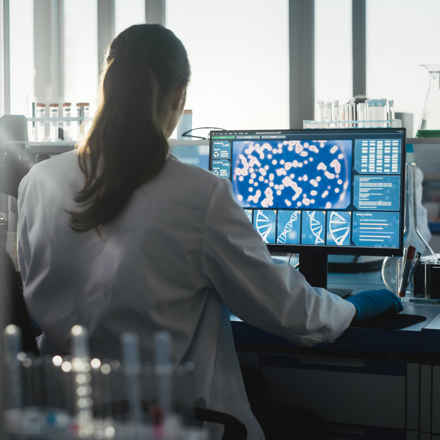How artificial intelligence is transforming eye care
Posted: Thursday 09 January 2025
Artificial intelligence (AI) is already part of our daily lives, but how is it changing healthcare? In a recent webinar hosted by Macular Society partner OcuPlan with Dr James Neffendorf, an eye specialist at King’s College Hospital and ophthalmic surgeon Dan Calladine, explored how AI is transforming the way eye care is delivered and how it is improving outcomes for patients.
AI is everywhere
Dr Neffendorf acknowledged the scepticism many have about AI. "AI is all around us and sometimes we don't realise it and actually it's the sign of an efficient technology when it seamlessly integrates into our normal life without being noticed." He used examples such as Google, social media, and even internet banking, where AI is already working behind the scenes.
He also highlighted the growing recognition of AI in the scientific community, noting that in 2024, many scientists received prestigious awards, including from the Royal Swedish Academy of Sciences. "These awards are given for the highest level of scientific ability and it shows you that AI is here to stay and it's going to have a major effect on all of us going forward."
How AI helps ophthalmologists
Dr Neffendorf explained how AI is benefiting ophthalmologists in three main ways:
Saving time
"In the UK, if you have diabetes, every year you're invited to have a photograph taken of the back of your eye," Dr Neffendorf said. "AI programmes are now looking at that sort of image and giving us a rapid answer as to what the diagnosis is. Clearly, that would make everything far faster, more productive, and get you, as the patient, to the right place in a faster way and ultimately get your treatment faster. This is especially helpful in areas where there aren’t many doctors."
Spotting problems early
AI can detect subtle changes at the back of the eye, helping identify conditions like age-related macular degeneration (AMD) before symptoms appear. "It has the potential to transform our ability to monitor disease, not only diagnose it. Catching problems early means better treatment and better results for patients." Dr Neffendorf added: "This lets us act quickly to stop the problem from getting worse."
Helping doctors and patients communicate
AI can help streamline communication by collecting essential patient information. "What we're working on are different systems where actually you can just give this information once to an automated, almost like a robot, and then that robot combines all the information and can disseminate it to the relevant doctors, so they can actually spend the time talking to you about the things you want to talk to them about."
Human error
Dan Calladine highlighted the challenge of human error when processing large amounts of data and how AI can help with this.
"It’s very hard as a clinician - you look back at people’s scans from the previous year, and sometimes changes are so slow that you actually do miss things."
He highlighted how AI could assist by analysing subtle changes that might go unnoticed: "We try our best, of course, not to miss things, but it’s just inevitable due to human error just to process that amount of data.”
Challenges of using AI
Despite the benefits, AI in eye care presents several challenges, which Dr Neffendorf also explored. The first challenge he addressed highlighted the importance of data quality: "The quality of the outcome of the AI that we use is dependent on the quality of the input." He added: "If you put very poor quality information into a system, the quality of the information you're going to get out of the AI system is going to be poor."
There's also the potential for AI to make mistakes, he said: "We clearly need to be concerned that any AI-enabled technologies could potentially make an incorrect decision and result in harm." These risks show why it's important to have humans check AI decisions and test the tools carefully before using them in healthcare.”
Working with AI
According to Dr Neffendorf AI is transforming eye care by making it faster, more accurate, and more consistent. "You should think of this as being a supportive way of working," he said. "It's the combination of the human elements with the machine or the AI elements, which is how medicine is developing."
He added: "I think, the benefits are that we're able to probably do things faster, with more accuracy. It's more repeatable, so it's not dependent on the doctor that you see on the day. We're removing that variability and being more consistent. And they say that together, everyone achieves more."
Watch the AI webinar:
Our webinars
Watch our latest webinars online. We asked the experts the questions you wanted answered: on food, staying safe at the eye clinic, and different macular conditions. Catch up with any webinars you missed, or watch again in your own time.



